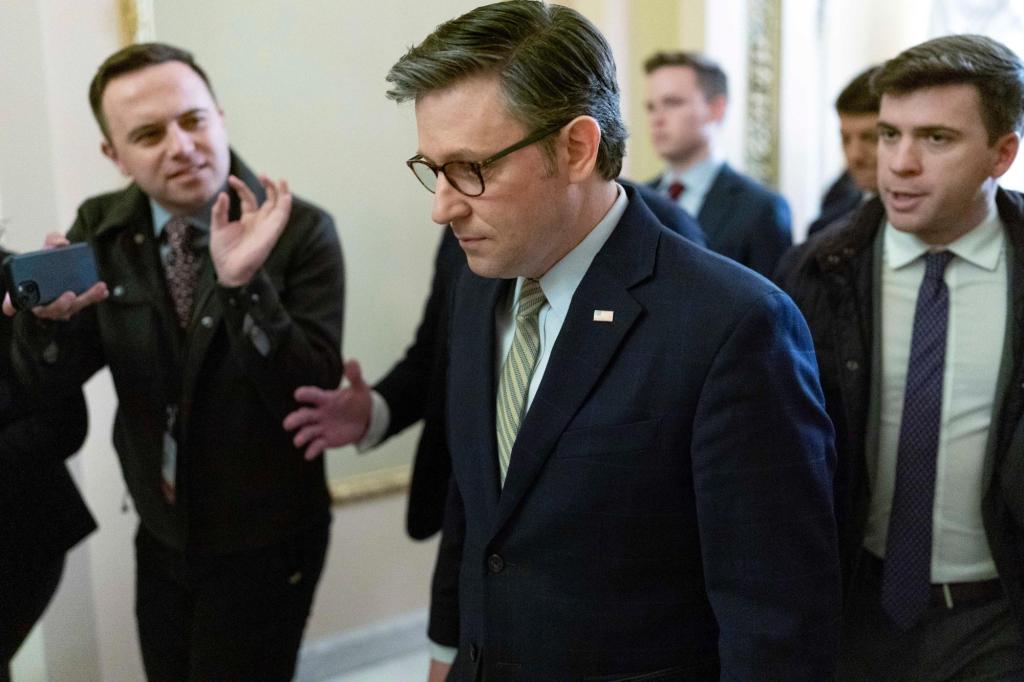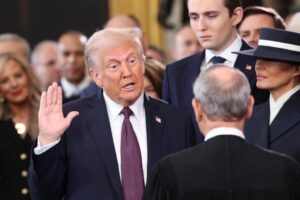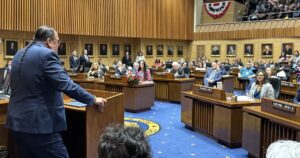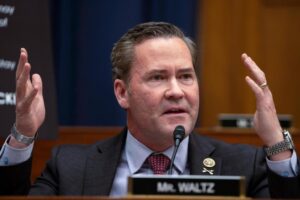
The Battle for House Speaker: Mike Johnson’s Crucial Moment
In what promises to be a pivotal day for the new Congress, the election of the House speaker looms large on Friday. The current Speaker, Mike Johnson, finds himself at the center of this political storm, facing challenges from within his own party that could impact not just his position, but also President-elect Donald Trump’s ambitious legislative plans.
Johnson, who has been working tirelessly to secure support, faces resistance from some GOP colleagues as he attempts to maintain his leadership role. With Trump’s agenda, including tax cuts and immigration policies, hanging in the balance, Johnson’s ability to consolidate his position is crucial. Despite Trump’s endorsement, Johnson’s hold on the gavel remains precarious.
“I think he’s banking a lot on people liking him,” said Sarah Binder, a professor of political science at George Washington University. The question remains as to what compromises Johnson might have to make to secure the speakership and how long he can maintain it once elected.
The role of the House speaker, a constitutionally mandated position second in line for presidential succession, has become a contentious and high-stakes affair. The Senate, which has already selected its leaders — Sen. John Thune for the Republican majority and Sen. Chuck Schumer for the Democratic minority — awaits the House to elect its speaker.
The process is reminiscent of the lengthy 2023 election when Republicans took almost a week and 15 rounds of voting to choose Kevin McCarthy as speaker. McCarthy’s subsequent ousting marked a historic first, reflecting the volatility within the GOP ranks.
As the GOP controls both the House and the Senate, the stakes are high for Trump’s return to the White House. Johnson seeks to avoid defeat, leveraging his connection with Trump and portraying himself as the political “quarterback” executing the president-elect’s plays.
Johnson expressed optimism about securing the votes needed, stating on Fox Business, “We have to stay unified.” He hopes to win the speakership in the first round of balloting without needing Trump to intervene directly.
However, without a confirmed speaker, Johnson warned of a potential “constitutional crisis” as Congress must count electoral votes by January 6, preceding Trump’s inauguration on January 20.
With a narrow majority of 220-215 and lacking full support, Johnson faces pressure from notable holdouts like Texas GOP Rep. Chip Roy, who criticized Republican leadership for not adhering to budgetary discipline. Roy stated his indecision regarding Johnson but hoped to support the GOP agenda.
Rep. Thomas Massie, R-Ky., is a likely opposition vote, while others remain undecided. The need for concessions remains a critical question, as past compromises have weakened previous speakers’ positions.
Johnson has already implemented a new rule requiring at least nine majority party members to support any motion to oust the speaker, a move aimed at stabilizing his leadership.
“I think the holdouts are going to have to realize that, listen, Trump is right all the time,” said Rep. Troy Nehls, R-Texas. The influence of Trump looms large over the proceedings, as noted by several Republican lawmakers.
Meanwhile, Democrats are expected to back their leader, Hakeem Jeffries, for speaker, signaling no intention to assist Johnson with their votes.
The opening session of Congress also marks historical milestones with the swearing-in of two Black women senators, Lisa Blunt Rochester and Angela Alsobrooks, as well as the first Korean American senator, Andy Kim.
The House welcomes Sarah McBride, the first openly transgender member, and witnesses the return of Nancy Pelosi after her recent surgery.
Despite these historical occurrences, the day’s focus remains on the speaker election, which could extend into multiple voting rounds. Rep. Juan Ciscomani, R-Ariz., expressed hope for a swift resolution, noting, “I hope that we can just vote for him on that first ballot, and then go move on to the business of the people.”
Rep. Tim Burchett, R-Tenn., added, “A large portion of that will be up to Donald Trump.”
Originally Published:






